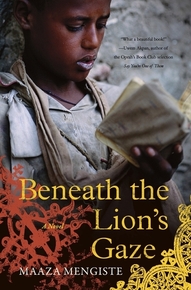Tadias Magazine
By Tadias Staff
Published: Monday, January 11, 2010
New York (TADIAS) – In the last few years we have witnessed the emergence of Ethiopian-American authors who are making their mark on the tapestry of American literature. The latest such work comes from Maaza Mengiste, a Pushcart Prize nominee who was recently named “New Literary Idol” by New York Magazine.
Her debut novel, Beneath the Lion’s Gaze depicts Ethiopia in the 1970s, when the country was undergoing a political revolution. The military had just deposed an archaic monarchy system with a promise of peaceful change. But what followed Emperor Haile Selassie’s removal was anything but peaceful. The country would soon plunge into unimaginable violence.
Following in the footsteps of other highly acclaimed works by Ethiopian-American authors including Nega Mezlekia (Notes Form the Hyena’s Belly) and Dinaw Mengistu (The Beautiful Things That Heaven Bears), Maaza delivers what Chris Abani calls “an important story from a part of Africa too long silent in the World Republic of Letters.”
The Library Journal adds “Although the depictions of brutality are extensive, they are also realistic and captivating, helping place Beneath the Lion’s Gaze into a small cadre of Ethiopian fiction, including Abraham Verghese’s Cutting for Stone and Camilla Gibb’s Sweetness in the Belly.”
Below is our Q & A with Maaza Mengiste:
TADIAS: Please tell us a bit about yourself. What/who motivated you to become a writer?
Maaza: I was born in Addis Ababa, and lived in Nigeria and Kenya before coming to the US. While living in the US, I made visits back to Ethiopia to see my family. I received my undergraduate degree from the University of Michigan and my MFA from NYU. I don’t know who specifically motivated me to be a writer. I’ve always loved to read and write. I think a combination of many writers gave me the courage to make the move into the literary world, especially world/international writers.
TADIAS: Can you share more about other writing projects you completed prior to this debut novel?
Maaza: Though this is my first major writing project, I have written a few short stories as well as some nonfiction pieces. My main focus over the past several years was this novel, however, and this didn’t give me very much time to do other writing.
TADIAS: Are your own memories of Ethiopia similar to the ones that you describe in your novel? If not, how are they different?
Maaza: Yes, some of my own memories shape this book, but I was also very young. Only after I was older was I able to put events and certain memories into historical and political context. As a child, all that you know is that there are gunshots at night, people are taken away, and you see soldiers, you’re afraid and you sense the fear, but you don’t necessarily understand the reasons.
TADIAS: Do any of the characters depicted in your novel mirror people that you know?
Maaza: Hailu, who is the central character and a doctor in my book most closely resembles my grandfather. However, my grandfather was not a doctor. He (and so many men of his generation) seemed to have a certain dignity and strength that I wanted to convey in Hailu. Most of the other characters are a combination of personalities I know, or purely fictional.
TADIAS: Your book is now part of a growing library of works which NPR has said is coming from a generation of Ethiopian Americans who are “part of a wave of young people whose families fled Ethiopia in the 1970s and who came of age in the United States…adding a new chapter to the epic of American immigration.” Is this something you identify with?
Maaza: I do see myself as part of a wave of Ethiopians who have left Ethiopia and are continuing to express that journey in one way or another. I am excited to see this “wave” grow, there is a new generation of Ethiopians who are telling their own stories through music, art, literature, science, through so many fields. It is impressive, and it reminds me that despite everything that has happened in Ethiopia, we will always continue to strive for a better future for ourselves and our families.
TADIAS: What do you enjoy doing in your spare time?
Maaza: I enjoy reading and spending time with friends and family. I enjoy photography.
TADIAS: Thanks for the interview and congratulations on the new book release.
Maaza: Thank you all for the support and encouragement. If you know of an artist, a writer, someone struggling to live their dreams, please encourage them also. We need many different voices and perspectives.
